| I bet most of you thought that I was never going to post another blog. I think that everyone on the BOD needed a bit of a break after Thanksgiving Holidays. I spent most of the weekend getting sheetrock up. The phone continues to ring. I need to deliver a draft horse cart this weekend to get it to the customer who bought it. The sleigh also leaves this weekend. I can't believe that the holidays are coming so quick, we haven't gotten our tree, put up our lights or even thought about getting ready. New developments on the animal front. I have 2 gelding llamas coming in this weekend. I have to drive out near Binghamton to get them. They are not a rescue per say, a really nice woman lost her husband.... can no longer really care for them and asked if I could help. I got a call last night on a bunch of sheep and goats that are about 2 miles from my house. I guess that the city people that own them have pretty much left. The animals are loose, in a major highway often in their quest for food. I told the people that called me that they would have to call the State Police and file a complaint. Once the troopers get called, they will need to investigate. If the animals are being neglected, the city slickers will get a ticket. Usually the people neglecting their animals have a chance to improve but often they will voluntarily surrender their animals if the troopers tell them they wont give a ticket. I made a couple of phone calls. Most of the people that I talked to didn't want to be involved. The trooper that I talked to said that he would check the complaint log. He said that no one has called in a complaint on them within the last month. I will have to follow up, I think that I might actually take a ride past the place tomorrow during lunch to see for myself what is going on. I don't call in complaints, if I get called in to do the rescue....it is a conflict of interest that could be used against me in court. I've done more rescues than I can count, I don't like to do rescues locally where I live. I usually have their kids in school and I don't want people around where I live "out to get me." I will still do what I need to do, if it is what needs to be done, regardless of my personal risks. I got 2 phone calls today, one on 3 Canadian Geese that needed some help. I will do what I can do. The other phone call was on 3 potbelly pigs and another small herd of goats that I might have to pick up. I like picking up goats, they are not easy to find homes for but most will end up on a dinner table if I don't. Potbelly pigs are almost impossible to find homes for. I am sure I will get several more emails, calls and requests by the end of the week. As the weather starts to turn bad, a lot of older people attempt to do the right thing and place their animals. It is rough for them to get their chores done in the bad weather. I have never thought less of someone that tries to do what is right by their animals before the situation gets bad. So there are lots of new developments. It is time to tighten the belt from Thanksgiving and get back to work. It is going to be difficult to get everything done before the snow flies, not that bad weather stops what we do here. I will try to get back on schedule giving you updates on what we are doing and the animals here at the farm. I had a couple of visitors here tonight at the farm. One woman needed to pick up some wormer for an older llama that she gave a home for. Barbie the llama loves her sheep and has been getting a little stiff lately. I hope that a good worming will straighten her out. Barbie had some Menegial worm problems when I rescued her. I think her new adoptive family is awesome. Another young woman that visited reminded me of how much I take for granted. Her folks were picking up their dog after it was groomed. They saw me leave to run Aaron home from doing chores. They actually waited for me to get back so I could turn on the lights in the barn. She was just visiting her folks from Arizona. She was amazed at what I do and took a bunch of photos as I gave her the tour. As she left, she said that I must be the luckiest guy in the world to have such a beautiful farm with so many great animals. It was a reality slap, sometimes I really do need to slow down and take a moment to enjoy what I do......Wes |
Please also see our other blog at
http://nywildliferescue.blogspot.com/
It is more active than this one. Always check there for updates, too.
Northeast Llama Rescue was started by Wes and Darcy Laraway of Middleburgh, NY.
Several years ago they rescued their first llama out of a tiny horse pen. Since that day, Northeast Llama Rescue has helped dozens of Camelids from several different states. The primary mission of Northeast Llama Rescue is to educate owners on how to properly care for their animals.
We also offer assistance with a traveling chute to shear, worm, and trim toenails on hard to handle animals. A 'TRUE REPUTABLE BREEDER" should help out the llama down the road that is not being cared for by owners that understand the needs of llamas.
If you know of a llama owner who is no longer able to care for their animals, there is help available. Members of Northeast Llama Rescue will adopt any unwanted animals. Rescue animals will be relocated to farms of members for training and necessary vet work.
If a llama is able to be rehabilitated, he will be available after a careful screening process. All rescues are placed in homes with a contract that says they shall be provided for and can not be sold. In the event a rescue animal becomes unwanted, the llama MUST be returned to Northeast Llama Rescue.
If you share our philosophy and love for the animals, you are more than welcome to join us! There are lots of llamas that need a person to love.
We also rescue farm animals, and are licensed wildlife rehabilitators.
This site is copyrighted by Wes Laraway.
Tuesday, November 27, 2007
New Developments
Subscribe to:
Post Comments (Atom)
Northeast Llama Rescue by Wes Laraway
The Northeast Llama Rescue was started by Wes and Darcy Laraway several years ago after they rescued their first llama out of a tiny horse pen. Since that day, the Northeast Llama Rescue has helped dozens of animals in 5 states. The primary mission of Northeast Llama Rescue is to educate owners on how to care for their animals properly. We also offer assistance with a traveling chute to shear, worm and trim toenails on hard to handle animals. If owners get "tired" of the daily maintenance of their herds, members of the Northeast Llama Rescue will adopt or buy, if possible, any unwanted animals. Rescue animals go to the farms or members of the organization.
The Northeast Llama Rescue does not wish to compete with other rescue organizations, although any llama or alpaca is welcome. We need to cooperate to help ALL camelids, not just registered or "nice-looking" ones. Everyone has the right to breed and sell llamas, but a true reputable breeder will "help out" the llama down the road that is not being cared for, regardless of its age, sex or conformation.
Our last rescue came from Central New York. A farm had purchased 9 animals from a Midwest auction. Four of the animals had died from natural causes....starvation? The owner had health problems and no longer wanted the animals. After several other concerned people failed to negotiate their sale, I eventually called and within five minutes we had agreed on a price and the deal was done. The next night, Wes Laraway, Kim Scheurerman and P.J. Wagner went to pick up the animals. The owner informed us that the llamas were wild and could not be handled. Within five minutes all were calmly caught, on lead ropes and in the trailer, with us using a wand and some TEAM Training techniques. The owner thought I was the "llama whisperer" because I got those llamas to do things in five minutes that she couldn't do in a year. She unfortunately knew nothing about handling llamas.
Three hours later, we were back into quarantine at Red Maple Farm starting "damage control". The animals were immediately wormed, fed fresh hay and grain, and watered. All were body scored under three by sight and by feeling through their wool. This hands-on inspection revealed barbed wire that needed to be cut out of the fiber. We decided NOT to shear because it was too late in the year and they were too thin.
Another concern was an ingrown halter. One of the best ways to remove ingrown halters is to undo the buckle(s) and cut the nose band with sharp toenail clippers on each side of the nose. Then gradually, over time, the remaining pieces will fall out. With application of an antibiotic cream, any wounds from the ingrown halter will heal quickly. In this particular case, the halter came out of the nose and was added to the "wall of shame" in our barn (along with the barbed wire and ear tags still on them from the auction they were purchased from). The blood stream stopped within fifteen minutes and now, after a month, we can tell that scarring will be minimal. Please tell everyone you know that owns camelids, NEVER leave a halter on a llama! Even in a week, with wet conditions, a halter can embed itself in a llama's nose.
My biggest concern was the 10 month old female that was exposed to her father. If bred, we decided to abort the unborn cria for the safety and well-being of the young female. None of these five animals were over the age of three years. All of them, over the following months, would need intense care and proper nutrition. The animals were all updated on health requirements and gelded. All of these animals would need training before they could go up for adoption.
New problems continuously arose. Two weeks after they arrived, one of the females surprised us with a weak, constipated fourteen pound male cria. Within hours I knew it wasn't "normal" so mom and baby were moved to a quarantine pen in the barn. The decision was made to supplement the cria with goat colostrum and give him an enema. Although the cria was walking, he continued to strain to relieve himself. Around the clock surveillance did not reveal any nursing or defecation. At two days old, I found very small maggots between the cria's toes and by his umbilical cord. After consulting my vet again, the cria got a bath and dried out in the heated office before going back to mom in the barn. My vet explained that crias born on rainy days must be completely dry or flies will lay eggs in moist areas of umbilical fluid. I've never heard of this problem before but I know now to check my newborn crias for maggots every day. After five days of constant care, we lost "Trooper"....I guess it was not meant to be, but we tried.
The rest of the animals are doing well today. Concerned individuals found them, bought them and will protect them. Today is actually a special day, because the vet did fecals on them and all five of them are parasite free and can join our llama herd. After training and further rehabilitation, by Spring 2001 this group of animals will be available for adoption to carefully approved homes. All animals sold or placed by Northeast Llama Rescue will be adopted with a legal contract. The contract states that if the llama ever becomes unwanted or is not cared for properly, the animal will return to Red Maple Farm for a full refund. I used to think I could save every unwanted llama in the world...I know that I can't . It is too great an undertaking for one farm to rescue all the unwanted camelids out there. For this reason, several other farms have joined in the effort with Red Maple Farm to pool resources and save neglected and unwanted camelids.
Any farm that shares our philosophy that every llama deserves a life with proper care is welcome to join us. We are people who genuinely love all llamas and want to make a difference one llama at a time. Eventually we will print an educational brochure to hand out at events with member farms listed. Don't just tell people that you love your llamas; show people by making a difference and actually save one. Always quarantine new animals for at least one month while getting wormings, vaccines and nutritional needs in order. Always do a fecal exam and consult your vet about when new animals should go out with the herd. Geld all males and most of all BE PATIENT. Llamas are very forgiving animals and will learn to love and trust again with gentle care and training.
The Northeast Llama Rescue does not wish to compete with other rescue organizations, although any llama or alpaca is welcome. We need to cooperate to help ALL camelids, not just registered or "nice-looking" ones. Everyone has the right to breed and sell llamas, but a true reputable breeder will "help out" the llama down the road that is not being cared for, regardless of its age, sex or conformation.
Our last rescue came from Central New York. A farm had purchased 9 animals from a Midwest auction. Four of the animals had died from natural causes....starvation? The owner had health problems and no longer wanted the animals. After several other concerned people failed to negotiate their sale, I eventually called and within five minutes we had agreed on a price and the deal was done. The next night, Wes Laraway, Kim Scheurerman and P.J. Wagner went to pick up the animals. The owner informed us that the llamas were wild and could not be handled. Within five minutes all were calmly caught, on lead ropes and in the trailer, with us using a wand and some TEAM Training techniques. The owner thought I was the "llama whisperer" because I got those llamas to do things in five minutes that she couldn't do in a year. She unfortunately knew nothing about handling llamas.
Three hours later, we were back into quarantine at Red Maple Farm starting "damage control". The animals were immediately wormed, fed fresh hay and grain, and watered. All were body scored under three by sight and by feeling through their wool. This hands-on inspection revealed barbed wire that needed to be cut out of the fiber. We decided NOT to shear because it was too late in the year and they were too thin.
Another concern was an ingrown halter. One of the best ways to remove ingrown halters is to undo the buckle(s) and cut the nose band with sharp toenail clippers on each side of the nose. Then gradually, over time, the remaining pieces will fall out. With application of an antibiotic cream, any wounds from the ingrown halter will heal quickly. In this particular case, the halter came out of the nose and was added to the "wall of shame" in our barn (along with the barbed wire and ear tags still on them from the auction they were purchased from). The blood stream stopped within fifteen minutes and now, after a month, we can tell that scarring will be minimal. Please tell everyone you know that owns camelids, NEVER leave a halter on a llama! Even in a week, with wet conditions, a halter can embed itself in a llama's nose.
My biggest concern was the 10 month old female that was exposed to her father. If bred, we decided to abort the unborn cria for the safety and well-being of the young female. None of these five animals were over the age of three years. All of them, over the following months, would need intense care and proper nutrition. The animals were all updated on health requirements and gelded. All of these animals would need training before they could go up for adoption.
New problems continuously arose. Two weeks after they arrived, one of the females surprised us with a weak, constipated fourteen pound male cria. Within hours I knew it wasn't "normal" so mom and baby were moved to a quarantine pen in the barn. The decision was made to supplement the cria with goat colostrum and give him an enema. Although the cria was walking, he continued to strain to relieve himself. Around the clock surveillance did not reveal any nursing or defecation. At two days old, I found very small maggots between the cria's toes and by his umbilical cord. After consulting my vet again, the cria got a bath and dried out in the heated office before going back to mom in the barn. My vet explained that crias born on rainy days must be completely dry or flies will lay eggs in moist areas of umbilical fluid. I've never heard of this problem before but I know now to check my newborn crias for maggots every day. After five days of constant care, we lost "Trooper"....I guess it was not meant to be, but we tried.
The rest of the animals are doing well today. Concerned individuals found them, bought them and will protect them. Today is actually a special day, because the vet did fecals on them and all five of them are parasite free and can join our llama herd. After training and further rehabilitation, by Spring 2001 this group of animals will be available for adoption to carefully approved homes. All animals sold or placed by Northeast Llama Rescue will be adopted with a legal contract. The contract states that if the llama ever becomes unwanted or is not cared for properly, the animal will return to Red Maple Farm for a full refund. I used to think I could save every unwanted llama in the world...I know that I can't . It is too great an undertaking for one farm to rescue all the unwanted camelids out there. For this reason, several other farms have joined in the effort with Red Maple Farm to pool resources and save neglected and unwanted camelids.
Any farm that shares our philosophy that every llama deserves a life with proper care is welcome to join us. We are people who genuinely love all llamas and want to make a difference one llama at a time. Eventually we will print an educational brochure to hand out at events with member farms listed. Don't just tell people that you love your llamas; show people by making a difference and actually save one. Always quarantine new animals for at least one month while getting wormings, vaccines and nutritional needs in order. Always do a fecal exam and consult your vet about when new animals should go out with the herd. Geld all males and most of all BE PATIENT. Llamas are very forgiving animals and will learn to love and trust again with gentle care and training.






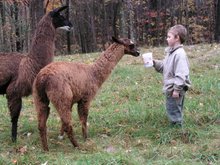
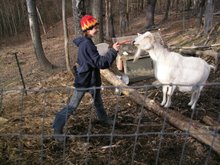
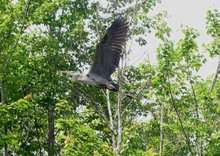
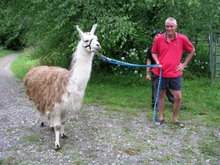
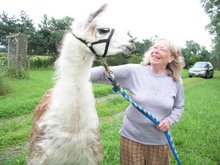
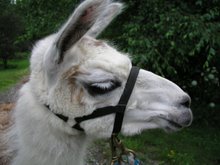




No comments:
Post a Comment